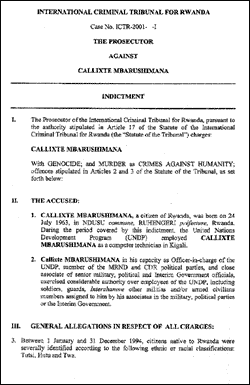 | Page one of the draft indictment against Callixte Mbarushimana
entire document |
In the summer of 2001, Greig interviewed more than 20 witnesses across Africa and Europe. He says their accounts were compelling.
"The picture we built up was that for some time prior to April 1994, Mbarushimana had formed a militia in Nyamirambo," says Greig. "They trained in the nearby soccer stadium and had done drills and weapons training. They had attended party meetings which from the description seemed to resemble (Nazi) Nuremberg rallies that had been used to whip of feelings of hatred."
In signed statements, witnesses said that during the genocide, Mbarushimana offered U.N. resources to militias and army troops. Greig says even more damning were witnesses who put Mbarushimana at the scene of massacres where scores of people were killed. At least four witnesses said they saw Mbarushimana personally shoot victims. Others said Mbarushimana appeared to be commanding attacks.
Greig says he concluded that although Mbarushimana was not one of the leaders who planned the genocide, he occupied a crucial mid-level role of implementing the targeted massacres. With thousands of potential war criminals to prosecute after Rwanda, the ICTR has primarily focused on the leaders of the genocide, but Greig says ICTR prosecutors recognized Mbarushimana could be an exception.
"Had he (Mbarushimana) not been a U.N. employee, he would have been just another mass murderer that wouldn't have excited the attention of the ICTR," says Greig. "His significance to the ICTR was that here was a U.N. worker who had targeted other U.N. workers and who had allowed U.N. facilities to be used to further the genocide. That was significant."
In the fall of 2001 a senior trial lawyer drafted an indictment that charged Callixte Mbarushimina with genocide and crimes against humanity. The document lists Florence Ngirumpatse, Mbarushimina's former coworker, as one of his targets. Had he been indicted, Mbarushimana would have been the first U.N. employee ever charged with war crimes by an international tribunal.
But months after Greig ended his work and left the tribunal, ICTR Chief Prosecutor Carla Del Ponte closed the Mbarushimana investigation. The draft indictment was never signed. Referring to the 24 witnesses interviewed by Greig's team, Del Ponte stated in a note of dismissal that the evidence did not establish "sufficient elements to justify any indictment of Callixte Mbarushimana for any of the crimes stipulated by the Statute of the ICTR."
Tony Greig says the dismissal document does not give sufficient weight to the evidence compiled by the ICTR's investigation.
"The evidence was there. It stacked up and it compared favorably with other cases I had dealt with," says Greig.
Greig is not the only one who thought so. A senior legal source close to the case, who asked to not be named, also believes there was sufficient evidence to support an indictment against Mbarushimana. The source also says the United Nations recognized a special responsibility in the case because Mbarushimana was a U.N. employee at the time of the alleged crimes.
The spokesperson for ICTR Chief Prosecutor Del Ponte, Florence Hartmann, says evidence "for and against" Mbarushimana led prosecutors to question whether the case would hold up in court. However, a U.N. official in New York says there were other factors complicating the case. The official notes that the Mbarushimana case came about at a time when the U.N. tribunals were under increasing pressure from the U.N. Security Council to focus on leaders of the genocide and jettison cases against mid-level suspects.
Mbarushimana and his lawyers say Del Ponte's order of dismissal represents a vindication. In his statement sent to American RadioWorks via e-mail, Mbarushimana said he had "lost 10 years of my life and have been separated from my family solely on the grounds of unsubstantiated allegations." He expressed "deep pain related to the massacres which claimed lives of many thousands of innocent people in Rwanda since 1990 and which, unfortunately, has continued beyond the end of the 1994 genocide." Mbarushimana added that the truth about the killings should be uncovered and "justice served."
|

